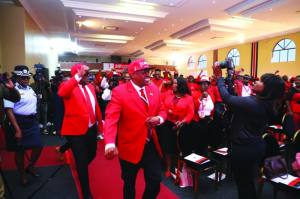The young children of Ngamiland, a district whose residents are ranked among the country’s poorest, have a home to go to when they find themselves in times of trouble.
The last study on poverty at the district level in the country found that Ngamiland East and West had poverty incidences ranging between 21% and 33%, meaning between one in five and one in three people in the two areas respectively were classified as poor.
Earlier this year, a pioneering report by Statistics Botswana and UNICEF found that children in the tourism heartland in the North West were amongst the poorest in the country with inadequate access to nutrition, health, housing and education.
Lorato House Centre, located in Maun, is providing hope to some of the young children caught in the cycle of poverty, vulnerability and abandonment.
Established by Jana Lackey and her spouse Jerry, Lorato House takes in children who have been referred by court order, typically orphans, the vulnerable and those with disabilities. The Lackeys have been serving in Botswana as missionaries for 35 years, developing programmes such as the Love Botswana Outreach Mission Trust, which aims to develop leaders for Africa, especially in the North West and Okavango region.
“All children at Lorato House come by court order, with council social workers managing the placements,” Jana explains. “The process begins with the identification of cases involving a child in need of care and/or protection. “A social worker then conducts a social inquiry into the alleged case and makes a submission at court with a recommendation for placement. “When convinced, the Magistrate will issue a court order for placement. “However, sometimes emergency cases are brought to us where there is no other option, but in these cases, it is via the police, after they receive hospital clearance.”
Lorato House was established in 2009, welcoming its first group of orphaned and vulnerable children aged less than five years old. At present, the shelter has 10 children aged less than three years old, 11 children aged between three and five years old and nine aged between five and 11 years, including those with disabilities.
Lorato House prioritises the needs of its children and offers various programmes to cater for their developmental growth. Services at the shelters are grouped into four main areas including Physical Care and Development, Early Childhood Development, which involves registering children in pre-schools as well as Recreation and Social, which involves outings, field trips, attending children’s church, celebration of significant events like birthdays and children’s picnics. The centre also provides Case Management which involves visits by social workers, follow-ups and assessments. Play therapy is also provided in the centre to help the children remain active. Lorato House has a state-of-the-art stimulation room with special equipment and resources for children with disabilities and special needs as well as to provide for emotionally distressed periods.
According to Section 43 of the Children’s Act, anyone can identify a child in need by reporting to the police or a social worker if they have reasonable doubt that a child needs protection and/or care. The law means Lorato House often finds its hands full.
Lackey explains that many of the children at the centre have been abandoned or dumped at birth or soon after.
“Teenage pregnancy is unprecedented in our nation and the result is sometimes even death due to abortions gone bad and baby dumping. “No woman wants to dump her baby, but at the moment there is no safe, legal option for a mother who finds herself alone with no structure of support. “We have children born to mothers as young as 12 years old in our care. “If there was a safe haven law in Botswana, a law that makes it legal to leave your baby at a safe place, we would have less baby dumping, and more mothers reaching out for help in a safe, legal way. “In most cases, where babies are left at a safe haven, the mothers do ask for help.”
Mental illness health also plays a significant role in many of the cases that end up at the shelter. The country is only now trying to better recognise and treat mental illness in all its manifestations, an effort that has previously been muted, particularly in the public health sector. Mental health issues such as depression have often been dismissed or misdiagnosed, but the advent of COVID-19 and the mental stress on more citizens have motivated health authorities in the country to pay more attention to this phenomenon. Lackey explains that Lorato House runs solely on donations and the support of the Ministry of Local Government and Rural Development.
“We are a faith-based organisation, in every sense of the word! “We operate purely by the donations and a lot of prayer. The ministry has been supportive and helps with the needs of the children. Local support is greatly needed. “Donations like marketing materials, volunteers, vehicles, toys, clothing, nappies, medicines, furniture and others would be helpful.”
Lackey lists Royal Tree Lodge, First National Bank Botswana, KFC, Delta Meat Deli, Red Cross, Mascom and individuals in the community as some of Lorato House’s donors.
Like any other non-profit organisation, Lorato House could use a few more helping hands.
“Human resources or funds to support human resources are our greatest expense and need. “We need vehicles to manage on the rough roads to get to the centre or for government to improve the roads. “The costs of water and electricity are a great challenge with the amount of washing, cleaning and cooking that goes on to keep the place clean. “Also needed is psycho-social support to the children and the caregivers. The work is intense and sometimes heartbreaking and funds do not allow for the real needs in this area.”
Other needs include nurses, health workers, physio, occupational and speech therapists to support the limits that exist in the North West’s health sector.
“Volunteers are needed in these areas on a regular basis. “Some children come malnourished and some cannot eat solid foods as in the case of our children living with disability. “Three meals and two healthy snacks are served daily and more food is needed to supplement what we get from the government. “It is because of the generosity of people who do bring food on occasion that allows us to see our children flourish and grow!”
Lackey urges people wishing to adopt children within Botswana to visit their local councils and seek legal advice. She also says as a society there should be a push for the placement of children in foster homes once their cases are closed.
*Tebelelo is a regular Mmegi contributor.







